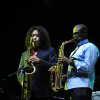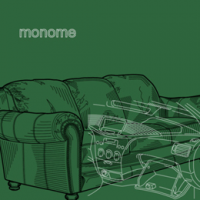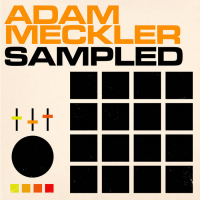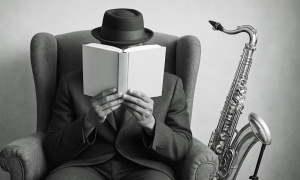Home » Jazz Articles » Interview » Li Gao Yang: Locks, Stock and Smoking Barrel
Li Gao Yang: Locks, Stock and Smoking Barrel
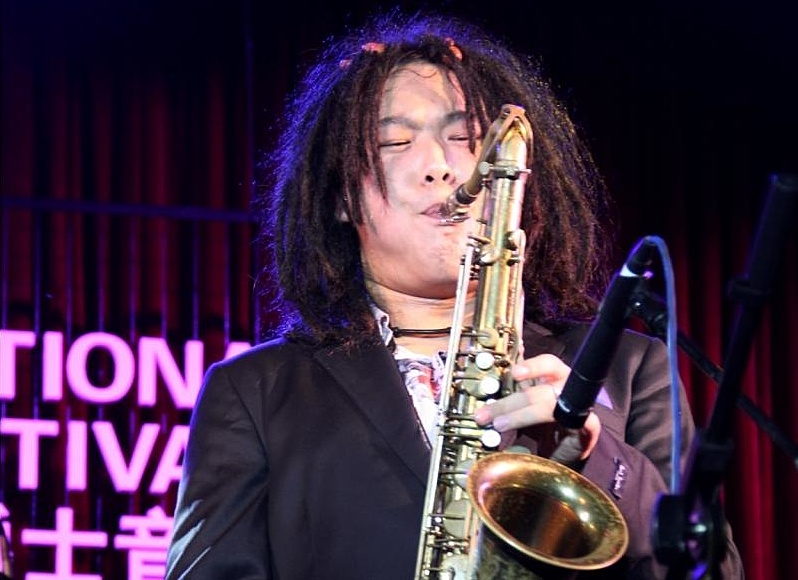
The day after the Li Gao Yang Quartet's performance at the Beishan International Jazz Festival in Zhuhai, southern China, Li was in relaxed mood, sitting at a long table in the 200 year-old Beishan temple/theater site, as he spoke candidly of his art. Li conversed in reasonable English, which didn't need the services of the attendant translator. Like his playing, Li's speech is lean and direct, and unadorned with unnecessary language.
This was the second time Li had played the BIJF, following his appearance the previous year, and judging by the warmth with which he was greeted when he took to the stage, a significant proportion of the audience seemed to remember him. That's not surprising, as his one-hour set the night before demonstrated, beyond a doubt, that his is, at least in this part of the world, a rather special talent. Tumbling bebop lines and rhythmically driving hard bop were the staples of a set where Li displayed impressive command of his instrument. His technical ability was clear from the very first solo, but Li is a musician first and a technician second; his lyricism was notable, and, like true leaders, he was more than generous with the space he shared with drummer Cameron Reid, bassist Rickard Malmsten and electric pianist Jim Schneider. His set revealed his passion, his influences, and his flexibility in giving his audience a little of what they want.
Surprisingly, given the obvious empathy and intuition between the four musicians, this was only the third time they had all played together: "It's only our third gig, but we've practiced together many times," says Li, "so we all know each other very well."
Li's musical journey began at the tender age of four, when, with his parents' encouragement, he started to learn the violin. Strings and bows, as it turned out however, weren't really for him: "I was attracted to woodwind instruments much more than stringed instruments," says Li, who around the age of seven became besotted with the saxophone after hearing it on TV one day. Li's parents were completely supportive of his newfound passion and it was a single lane highway from that point on.
Li's commitment to his instrument was total: "I used to practice ten hours every day," he says in a neutral tone, as though this were the most natural thing in the world, "but now I have a lot of business to deal, with so I only practice about two hours a day." Li is a throwback to the old school of jazz: "I like black music," he states. "Lester Young, Coleman Hawkins, Johnny Griffin, Dexter Gordon, Hank Mobley, Sonny Rollins, John Coltrane and [as one notable exception] Michael Brecker. I like alto players like Charlie Parker, Jackie McLean, Sonny Stitt and [another non-African-American] Phil Woods . For free jazz I like Eric Dolphy."
Of these illustrious names only Brecker began in an era post-bebop and hard bop. Do any of the contemporary saxophonists excite Li? Steve Coleman perhaps? "The only Coleman[s] I like are Hawkins and Ornette," he replies without hesitation. Then, after a brief moment's thought he adds: "There are a few I like, but they are the more traditional players. I like [alto saxophonist] Antonio Hart, because he has a traditional sound." Hart played with trumpeter Dizzy Gillespie in some of his final concerts, and has also collaborated with pianist McCoy Tyner and bassist Dave Holland, so when Li took lessons from Hart when the Baltimore saxophonist was in Beijing, he was tapping in to that sort of pedigree.
Li has clearly fond memories of his encounter with Hart: "I played a concert with him in a bar in Beijing called Eastern Shore. It was amazing." Hart had measured praise for Li: "He said I have a good foundation," says Li. This comment was surely meant to motivate Li to stretch himself, to keep pushing himself: "He advised me to practice more," recalls Li, "and to do everything slowly." Li has certainly taken a lot on board in a relatively short time. Technically and intuitively, he has ability beyond his years.
Li's talent is a combination of long years of dedication, sacrifice and an evident natural affinity for this music. It's also cause for a degree of frustration when he plays with other Chinese jazz musicians: "The young musicians are not so good," he says frankly. "Maybe their technique is very good but they don't know what I'm playing; they can't follow me. I can't play with them. They play like rhythm machines, but if you change the rhythm or play outside the box they can't follow," he says matter-of-factly. "They should study and learn their instruments better," Li says, by way of constructive criticism.

"The older musicians can follow," Li expands, "because they have a lot of experience. I only tend to play with Chinese jazz musicians above the age of 30 in Beijing." So, who are the Chinese jazz musicians to watch out for? "Hu Hao, the bassist in my band, is a great musician" says Li. "My drummer, Shao Haha" he adds. "Before he played jazz he was a rock 'n' roll drummer. He has studied with Izumi Koga, a famous Japanese drummer in Beijing. Most drummers who play jazz in China are taught by him. Koga's played and taught for many, many years and he's the best drummer in Beijing."
Li's quartet has a residency in Beijing's CD Jazz Café: "I play there every Wednesday with my Chinese quartet. It's the oldest jazz club in Beijing," says Li. "It's a venue for people who like jazz and blues. Some westerner expats also come." As Li describes it, the venue seems to have a nice informality about it and openness to visiting musicians: "We have a jam session before we finish the second set," says Li. "Sometimes visiting bands come and sit in, guys from Denmark, Sweden, Poland, England or the US. Maybe they're in Beijing for the festival but they also come for smaller gigs. The jazz gigs in Beijing are in small clubs or bars because not that many people want to go to a theater to see jazz."
Li's quartet played a mostly traditional set at the Beishan International Jazz Festival, with Li's original compositions, Sonny Stitt's "Eternal Triangle" and, towards the end of the set, a couple of jazz-funk crowd pleasers: the self-penned "222" and Stevie Wonder's "Isn't She Lovely?" It was, says Li, a fairly typical set. "Because we're playing in China we play more traditional jazz. We also need to play some funky tunes or some pop tunes like Stevie Wonder," he explains. "They might not know the song but they can appreciate the melody. If you play too much stuff like Charlie Parker, John Coltrane or Sonny Rollins you will turn people off in China. We can play a few songs like that, but we need to include some funky tunes."
Li has had the opportunity to play abroad in Japan and Europe, where the differences in approach to jazz were striking for him: "In Japan they have very good training," says Li. "They're very serious; very serious to study anything. They know the tradition very well, but in Europe a lot of new guys are classically influenced and I can't play with them. In Japan more musicians play hard bop and bebop. Everyone must know bebop in Japan. In Europe, I don't know if that's the case."
In Tokyo, Li had the opportunity to catch pianist Chick Corea's trio at the city's famous Blue Note jazz club: "That was with [bassist] Christian McBride and [drummer] Brian Blade. It was amazing," says Li. Even more amazing for Li, was the chance to see his idol, Sonny Rollins, perform at the Copenhagen Jazz Festival in 2011. Not only that, but Li got to meet the Saxophone Colossus in person: "It was amazing-I was really lucky," acknowledges Li. "Before I went to his hotel to meet him I had lunch with [bassist] Bob Cranshaw and [drummer] Kobie Watkins." Rollin's band had watched Li perform as well, and they paid him a very nice complement: "They said my style is like Johnny Griffin," recalls Li.
The icing on the cake for Li was meeting Rollins, one of the most influential-and incombustible-tenor saxophonists in jazz's history. What did Rollins say to Li? "Keep blowin," says Li.
With relatively few opportunities to play jazz in China, Li may have to consider moving abroad if he wants to raise his game: " It's not really possible," he says, "because there are too many amazing musicians already in New York or London." So, for the time being at least Li is staying put in Beijing: "It's easier for me to play jazz in China," admits Li, "though next year maybe I will play in the US, Copenhagen, Taipei and Japan."
At present, Li doesn't have what he calls a "serious" CD, though he has a self- produced live recording from last year's Hong Kong International Jazz Festival. That may change in 2013, though Li says that it will be more smooth jazz and pop than traditional jazz. So, won't there be any of his beloved bebop or hard bop then? Li laughs at the suggestion, and his answer reflects the challenges of growing jazz in China: "That is not possible. I would need to spend a lot of money to record a CD and that type of jazz won't sell in China."

The market in China for traditional, or classical jazz CDs, may be small, but there is a growth in the number of jazz festivals throughout the country. This means that more bands from around the world are bringing their various styles of jazz to a curious, and very young, Chinese audience. The Beishan International Jazz Festival is just one example of this growth: "This year is better than last year," observes Li. "The bands are better. It's a fantastic festival and I wish it well. I would love to come back and play here again."
The BIJF would no doubt love to have one of China's most outstanding jazz musicians grace its festival again, and so too would the audience, who greeted Li's quartet performance with such enthusiasm. With a very solid foundation already, a passion for the music-and Sonny Rollin's encouragement ringing in his ears-it's clear that Li is going to keep on blowin' for a very long time to come.
Photo Credits
Page 1: Xiaojing Lee
All Other Photos: Courtesy of Li Gao Yang
Tags
PREVIOUS / NEXT
Support All About Jazz
 All About Jazz has been a pillar of jazz since 1995, championing it as an art form and, more importantly, supporting the musicians who make it. Our enduring commitment has made "AAJ" one of the most culturally important websites of its kind, read by hundreds of thousands of fans, musicians and industry figures every month.
All About Jazz has been a pillar of jazz since 1995, championing it as an art form and, more importantly, supporting the musicians who make it. Our enduring commitment has made "AAJ" one of the most culturally important websites of its kind, read by hundreds of thousands of fans, musicians and industry figures every month.


